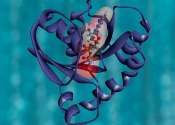Researchers identify caffeine-consuming bacterium
As it turns out, humans aren't the only organisms that turn to caffeine for a pick-me-up. University of Iowa scientists have identified four different bacteria that actually can live on caffeine.
As it turns out, humans aren't the only organisms that turn to caffeine for a pick-me-up. University of Iowa scientists have identified four different bacteria that actually can live on caffeine.
Cell & Microbiology
Jun 7, 2011
0
0

A combined team of researchers from the University of Geneva and the University of Tampere has identified a protein that plays a major role in enabling cells to perceive their environment and also to anchor in the right places. ...

(Phys.org) —The discovery of the Rosetta Stone resolved a longstanding puzzle, permitting the translation of Egyptian hieroglyphs into Ancient Greek. John Chaput, a researcher at Arizona State University's Biodesign Institute ...
Biochemistry
Mar 21, 2013
1
0
A bacteria that lives in hot springs in Japan may help solve one of the mysteries of the early evolution of complex organisms, according to a study publishing next week in PLoS Biology. It may also be the key to 21st century ...
Cell & Microbiology
Jun 8, 2010
2
0

University of Minnesota Crookston researchers, aided by students, are shedding light on freshwater sponges in Minnesota, which may be indicators of water quality.
Plants & Animals
Mar 11, 2019
0
4
(PhysOrg.com) -- After being recognized and initially processed by the cellular machinery, the broken chromosome is extensively scanned for homology and the break itself is later tethered to the nuclear envelope. Thus the ...
Feb 13, 2009
0
0

Changes known as epigenetic modifications play an important role in cancer development. Being able to analyze them quickly and reliably could contribute significantly to the further development of personalized therapy. A ...
Bio & Medicine
Aug 31, 2022
0
131

(Phys.org)—One of Ozgur Sahin's first machines was a mechanical adding device made from Legos. He made it when he was 11 and hasn't stopped making gadgets since. In graduate school Sahin created an atomic force microscope ...
Nanophysics
Jan 30, 2013
0
1
A new international study co-authored by a University of Florida researcher describes one of the most comprehensive analyses of Lepidoptera evolutionary relationships to date, and could have broad implications in the fields ...
Plants & Animals
Apr 15, 2013
0
0

A study published in Nature today describes the sugar beet reference genome sequence generated by researchers both from the Centre for Genomic Regulation (CRG), the Max Planck Institute for Molecular Genetics and the University ...
Biotechnology
Dec 19, 2013
0
0